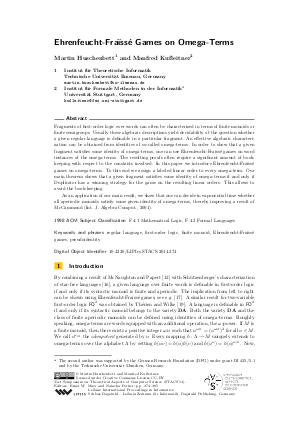Ehrenfeucht-Fraïssé Games on Omega-Terms
Authors Martin Huschenbett, Manfred Kufleitner
-
Part of:
Volume:
31st International Symposium on Theoretical Aspects of Computer Science (STACS 2014)
Part of: Series: Leibniz International Proceedings in Informatics (LIPIcs)
Part of: Conference: Symposium on Theoretical Aspects of Computer Science (STACS) - License:
 Creative Commons Attribution 3.0 Unported license
Creative Commons Attribution 3.0 Unported license
- Publication Date: 2014-03-05
File

PDF
LIPIcs.STACS.2014.374.pdf
- Filesize: 0.67 MB
- 12 pages
Document Identifiers
Subject Classification
Keywords
- regular language
- first-order logic
- finite monoid
- Ehrenfeucht-Fraïssé games
- pseudoidentity
Metrics
- Access Statistics
-
Total Accesses (updated on a weekly basis)
0PDF Downloads0Metadata Views
Abstract
Fragments of first-order logic over words can often be characterized in terms of finite monoids or finite semigroups. Usually these algebraic descriptions yield decidability of the question whether a given regular language is definable in a particular fragment. An effective algebraic characterization can be obtained from identities of so-called omega-terms. In order to show that a given fragment satisfies some identity of omega-terms, one can use Ehrenfeucht-Fraisse games on word instances of the omega-terms. The resulting proofs often require a significant amount of book-keeping with respect to the constants involved. In this paper we introduce Ehrenfeucht-Fraisse games on omega-terms. To this end we assign a labeled linear order to every omega-term. Our main theorem shows that a given fragment satisfies some identity of omega-terms if and only if Duplicator has a winning strategy for the game on the resulting linear orders. This allows to avoid the book-keeping. As an application of our main result, we show that one can decide in exponential time whether all aperiodic monoids satisfy some given identity of omega-terms, thereby improving a result of [McCammond, Int. J. Algebra Comput. 2001].
Cite As Get BibTex
Martin Huschenbett and Manfred Kufleitner. Ehrenfeucht-Fraïssé Games on Omega-Terms. In 31st International Symposium on Theoretical Aspects of Computer Science (STACS 2014). Leibniz International Proceedings in Informatics (LIPIcs), Volume 25, pp. 374-385, Schloss Dagstuhl – Leibniz-Zentrum für Informatik (2014)
https://doi.org/10.4230/LIPIcs.STACS.2014.374
BibTex
@InProceedings{huschenbett_et_al:LIPIcs.STACS.2014.374,
author = {Huschenbett, Martin and Kufleitner, Manfred},
title = {{Ehrenfeucht-Fra\"{i}ss\'{e} Games on Omega-Terms}},
booktitle = {31st International Symposium on Theoretical Aspects of Computer Science (STACS 2014)},
pages = {374--385},
series = {Leibniz International Proceedings in Informatics (LIPIcs)},
ISBN = {978-3-939897-65-1},
ISSN = {1868-8969},
year = {2014},
volume = {25},
editor = {Mayr, Ernst W. and Portier, Natacha},
publisher = {Schloss Dagstuhl -- Leibniz-Zentrum f{\"u}r Informatik},
address = {Dagstuhl, Germany},
URL = {https://drops.dagstuhl.de/entities/document/10.4230/LIPIcs.STACS.2014.374},
URN = {urn:nbn:de:0030-drops-44729},
doi = {10.4230/LIPIcs.STACS.2014.374},
annote = {Keywords: regular language, first-order logic, finite monoid, Ehrenfeucht-Fra\"{i}ss\'{e} games, pseudoidentity}
}
